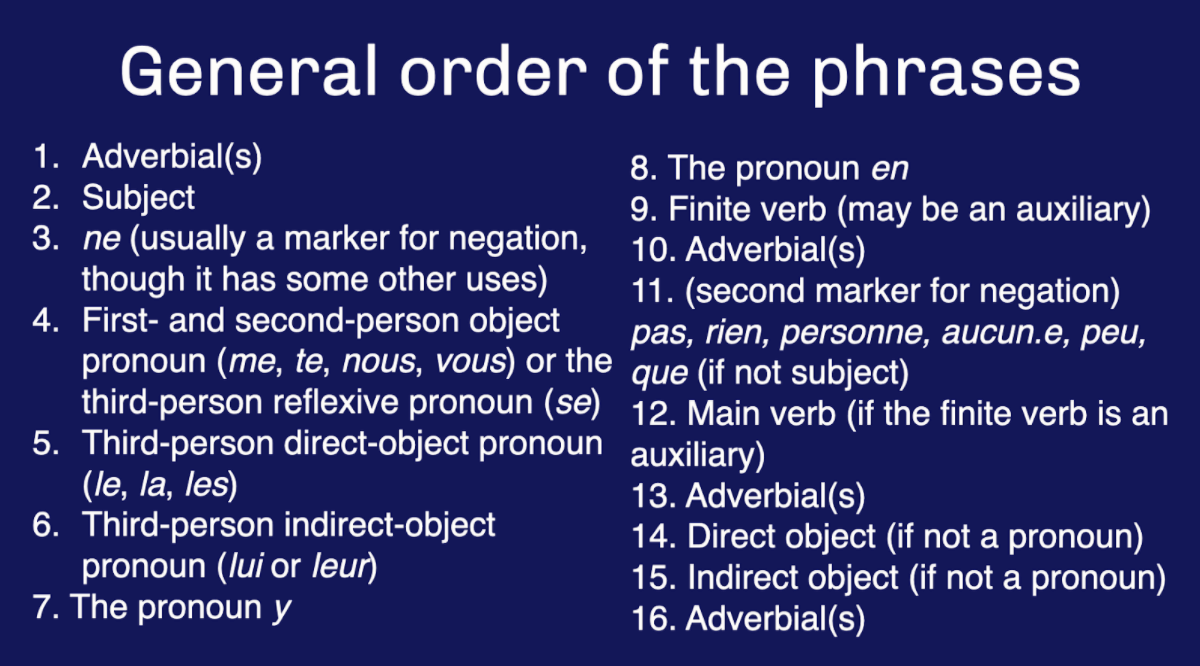How to make French sentences easily
Working as a French coach, I’ve noticed that French word order is one of the trickiest things for English speaking students. Building French sentences, especially as you speak, can be very challenging.
Luckily, there are a few tricks that can help you solve this issue. So that’s what we’ll see today: 7 rules of thumb that you can apply right now to make better French sentences with less effort.
Watch the video, or read on below.
French word order is 80% similar to English word order
French word order isn’t totally random. It’s actually 80% similar to English word order.
Linguists like to categorize languages according to the order of the three main components of a sentence: subject, verb and object (SVO).
All possible combinations (SOV, SVO, VSO, VOS, OSV, OVS) exist among human languages, but each language has a fixed order. Only 33% of languages follow the “SVO” order, including English and French. So we got pretty lucky there.
I speak English. ↔ Je parle anglais.
In this simple sentence, you can see that the words are in the exact same order in French and in English. We can be grateful for this, as most other languages wouldn’t have this particularly.
This means that, in regards to French word order, an English native’s intuition will be correct most of the time.
As often though, the devil is in the details.
There are a lot of details that I can’t possibly include in a simple blogpost like this. In fact, I created a 69-minutes workshop (available in the French Fluency Accelerator), where I explain all the details one by one in an easy to understand, progressive manner. So, if you get value from this article, I encourage you to join the program, as you’ll get even more value from it.
When creating that workshop, I fell down a rabbit hole when I realized that, no matter how good you are at searching the internet, it was impossible to get clear and exhaustive information about French Word Order. Even the wikipedia article about French grammar had it wrong. I eventually edited it to reflect the actual word order of French sentences, with all of its 16 (!) positions.
Here is a slide from the workshop showing all 16 positions:
If you don’t understand everything on this slide, don’t worry, you don’t need to. All French speakers speak intuitively and do not know this order formally. As a learner, you can rely on the following rules of thumb:
2. Make simpler sentences.
As we saw, all important elements are in the same order in English and in French. It’s only the details that trip you up.
The best solution is often to make simpler, shorter sentences, and use more sentences to express your thoughts. This way, you will make the most of the basic sentences structure, and avoid most of those challenging details.
I have shared more about this strategy and why it works in this in this article + video.
3. Use fewer clauses.
The 16 positions above aren’t even the order of words in a sentence. They’re actually the order of words in each clause.
A sentence can have several clauses. In fact, there’s no limit to how many clauses you can string together into one sentence.
But the more clauses you include, the more challenging it is to make the sentence grammatically correct. And the harder it is for the listener to understand what you mean, even in English.
Of course, when you speak a foreign language, it only gets worse.
French grammar is often slightly different from English grammar. If you and/or the listener isn’t very proficient in French, you have the recipe for disaster.
Don’t do this to yourself.
You don’t have to say:
“Après avoir lu cet article, qui est très utile, mon Français, qui avait été mauvais, s’est considérablement amélioré”
“After I read this article, which is very helpful, my French, which had been bad, improved dramatically.”
You can say:
“Mon français était mauvais. J’ai lu un article. L’article était très utile. Mon français s’est amélioré”
“My French was bad. I read an article. The article was very helpful. My French improved.”
Can you see how this is so much easier?
4) Use adjectives sparingly
This is one of the main differences between French word order and English word order.
In English, 99% of adjectives go before the noun. In French, most adjectives go after the noun, but some common ones will go before the noun, and it’s not easy to know which are which.
Ultimately the solution is to learn a list of adjectives that are placed before the noun. They are often short adjectives that refer to Beauty, Age, Goodness and Size (this is easy to remember with the BAGS acronym). However, this is not an infallible rule. French adjectives are an inexhaustible can of worms - I also made a workshop about adjectives in the French Fluency Accelerator to help my students navigate these troubles water. So, feel free to join us.
Here’s the good news though: you don’t need adjectives.
All nouns will fare very well without any adjectives, and removing the adjectives is an easy way to make a sentence simpler.
If the information from an adjective is critical, you can use this simple hack to include it:
Instead of saying “Le chat noir est gentil” (the black cat is nice), You could say “Le chat est noir. Il est gentil” (The cat is black. He is nice). This trick allows you to fall back onto the 80% of French word order which is similar to English.
5) Avoid the adverb trap.
French adverb placements can be a little bit different from English.
Specifically, in English you can put an adverb between the subject and the verb (‘I really like pizza’) but not between the verb and the object. You can’t say ‘I like really pizza’ , but French people often make this mistake in English, because in French, the opposite is true. You can say “J’aime vraiment la pizza’ but not “Je vraiment aime la pizza”
I often advise my students to put adverbs at the very end or at the very beginning of the sentence to avoid such pitfalls. (I like pizza, really / J’aime la pizza, vraiment. Or: Really, I like pizza./ Vraiment, j’aime la pizza) If you focus on shorter sentences, this rule of thumb will work most of the time.
An even more drastic solution is to avoid adverbs altogether. Adverbs are never necessary. So if you’re in a high-pressure situation and you’re not sure about your adverbs, just skip them.
6) Negative sentences can be tricky.
In French, negative sentences will often include a “negation sandwich”, formed by placing “ne” and “pas” around the conjugated verb. (In casual French, “ne” will often be skipped.)
So, you will only be able to use the negation correctly if you can identify the conjugated verb. If that sounds simple enough, just wait until we factor in compound tenses, auxiliary verbs, passive voice, and complex sentences. It can quickly get out of hand.
Besides, placing “pas” incorrectly can even result in a correct sentence… with a different meaning than what you intended!
(The French Fluency Accelerator also includes not one but several workshops about verbs, tenses, voices and forms to help you make sense of all this.)
Here too, the solution is to make shorter sentences. The shorter the sentence, the more likely you are to be correct. Shorter sentences are also more likely to be understood, even if they contain mistakes.
7) Some things are much simpler in French
The conjugated verb (that goes in the middle of ne...pas - see above) can be an auxiliary verb. The good news here is that French uses rather few auxiliary verbs.
Only “avoir” (have) and “être” (be) can be used as auxiliary verbs. Some teachers choose to also include “aller” (go / be going to) in this category, because “aller” sometimes looks like an auxiliary verb, even though it isn’t actually one.
On the contrary, English relies on a plethora of auxiliary verbs (do, be, have, will, should, would, could, etc.) which are used to create many different tenses and aspects.
Aspects are one of the most challenging things for my students, precisely because there are no aspects in French.
In English, there is a significant difference between “I speak English (in general)” and “I am speaking English (right now)”.
In French, this distinction doesn’t exist. Both sentences translate as “Je parle anglais”.
If you aren’t yet used to thinking in French, it’s likely that this will challenge you as well.
In French, we use the simple present in many cases where we wouldn’t use it in English. French is actually simpler than English in this regard, but you’ll need to “unlearn” the English grammar so appreciate how simple French is and feel confident making such sentences.
Improve one step at a time.
The strategies outlined in this article should be enough to get you started. If you remember to use the tricks I shared and to make shorter sentences, communicating in French will be so much easier.
Once you are ready to take the next step on your French journey, I’ll be happy to welcome you in the French Fluency Accelerator. This program is designed to help English speakers learn French easily by providing them with a clear plan and great guidance along the way. Click here to learn more and join us.
Your next steps
If you like this way of learning French, you will love to learn with me as a student or client. Please check out:
My 1-1 coaching program, The French Transformation, if you need to improve your French fast.
My group program, The French Fluency Accelerator, if you’d like to join a community of students from all over the world. We have weekly practice calls together and the best online video library to learn French.
Pro tip: you don’t need to choose!
All my 1-1 clients are invited to join the French Accelerator free of charge.
Feel free to book a call with me now to discuss options.
About the authors
Angel Pretot is a French learning coach. He works online with English speakers from all over the world, helping them learn French fast and become fluent.
You can work with him, in his one-on-one program the French Transformation, take some of his self-study courses, or join a global community of French learners in his group program the French Fluency Accelerator.
Linda Unger is an avid French Learner who dreams of having a stone house in Bretagne someday. She also loves writing, knitting and dogs. She joined the French Fluency team as a writer in 2020.








